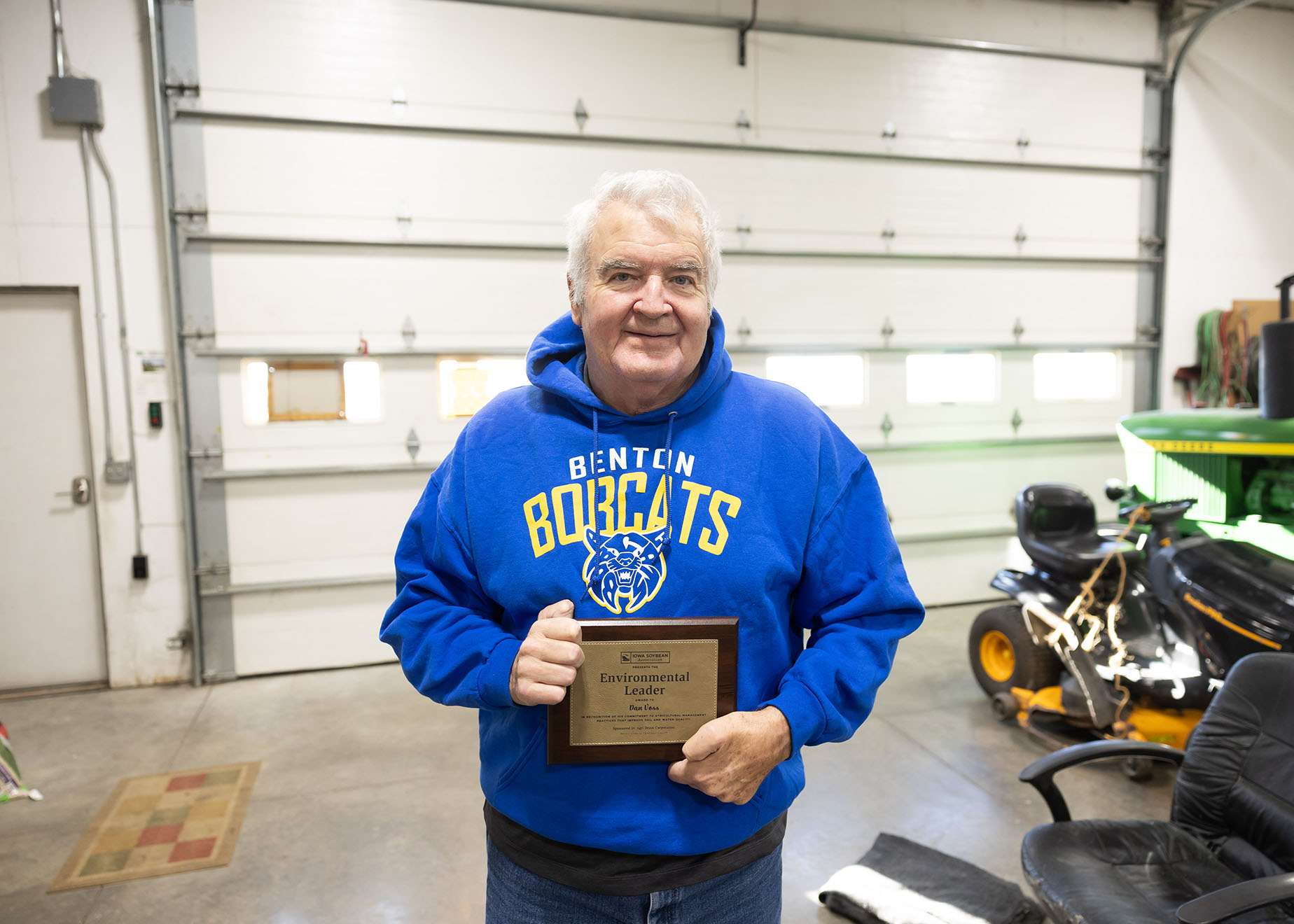
Dan Voss with the 2025 Iowa Soybean Association Environmental Leader award on his farm near Atkins. (Photo credit: Iowa Soybean Association/Joclyn Bushman)
Iowa’s Environmental Champion
March 31, 2025
By Jeff Hutton
For Dan Voss of rural Atkins, the accolades are nice, but for this veteran farmer, the true measure of a man is what happens in the fields.
There’s no denying Voss’ efforts in conservation have taken root; the rest of the state has noticed.
And it’s why he has received the 2025 Iowa Soybean Association’s (ISA) Environmental Leader award, presented by Agri Drain.
‘All things conservation’
“Voss defines what it means to be an environmental leader,” nominations for Voss say.
Since beginning no-till and strip-till in the 1990s with his father, Dan has taken conservation in agriculture to new levels. He is recognized by the local farming community as an expert in all things conservation.
He added cover crops to the farming operation in 2012 on one field. Since then, all his acres, including rented acres, have cover crops. Cereal rye is always a part of the mix, but he is trying other species in his mixes to see what will add diversity to maximize soil health benefits. Each year Dan also grows oats which he harvests for grain and straw bales.
And it’s not just about his fields and his bottom line. Voss is a big promoter of enhanced water quality and how agriculture can positively impact the local drinking water.
Not far from Cedar Rapids, Voss’ farm ground has a direct impact downstream to the alluvial wells from which the city draws its drinking water. Voss installed a bioreactor three years ago. He was recently involved in the Middle Cedar Batch and Build where another bioreactor was installed. Batch and Build is a strategy where multiple conservation practices, like saturated buffers and bioreactors, are installed on several farms simultaneously, allowing for a significantly faster implementation of water quality improvements compared to installing them individually on each farm. It accelerates water quality progress by streamlining the process for landowners and contractors. Voss says he utilizes edge-of-field practices because he believes they are a benefit for society.
As an ISA member, Voss has also gotten involved in water and tile monitoring. The data gathered from his farm has proven that nitrates have been reduced by his in-field practices of no-till/strip-till, cover crops and bioreactors. He planted a prairie strip on the home farm in the fall of 2023. With careful management, this acre-sized prairie strip will attract pollinators and provide wildlife habitat amongst row crop production. He’s also a participant in the Eastern Iowa “Conservation in Action” tour promoted by ISA, Iowa Agriculture Water Alliance (IAWA), Linn Coop, Truterra, and the City of Cedar Rapids.
“By reducing tillage, planting cover crops, adding edge of field structures, and proper nutrient management, Dan demonstrates that the future of agriculture starts now,” according to his nomination. “Dan never passes an opportunity to engage with the community on how to add these practices and the benefits they bring. Dan has welcomed multiple tour groups from ISA and other organizations to his farm and is a true advocate for Iowa agriculture.”
Conservation is a process
This ISA award is just the latest recognition Voss has received. He was awarded the Iowa Department of Agriculture and Land Stewardship’s (IDALS) 2023 Conservation Farmer of the Year award, co-sponsored by the Iowa Farm Bureau.
He says he was pleased about this latest honor.
“I was excited about it because there’s a lot of good things going on with conservation in Iowa,” he says. “But then again, I’ve been doing this stuff for quite a long time.”
Voss says conservation practices are truly a “win-win,” because of the results — more organic matter and an increase in both soybean and corn yields. That proved beneficial in 2023 when his area saw deep drought conditions and he saw corn yields ‘significantly above’ the county average.
And while conservation practices have benefited Voss, he knows other farmers must understand what is involved and approach conservation implementation through baby steps.
“When I started with cover crops, it was only a small field with oats,” he says, noting he quickly realized conservation practices could be an effective way to protect his fields from erosion.
He points to how his efforts, and those of neighboring farmer Jim O’Connell, are positively impacting water quality downstream in Cedar Rapids.
“Look at Cedar Rapids,” he says. “They want quality water for their production facilities and residents. The public wants it. We all need to do something to work toward that goal. It pains my heart to drive down the road and see planting right next to a stream. I hate to see that soil slough off into the creek.”
Benefiting the community
“Dan has been a conservation leader here in east central Iowa,” says ISA Conservation Agronomist Evan Brehm. “He and his family have been continuously utilizing and adding conservation practices on their row crop acres. Dan has seen the agronomic and environmental benefits by using cover crops, his no-till/strip-till practices, and adding edge-of-field implementations such as saturated buffers.”
Voss says conservation means working together for the good of society. He believes things are changing in Iowa agriculture for the better.
“I think we’re starting to make some headway,” he says. “I think in our area, people notice what we’ve (Voss and O’Connell) been doing and trying it on their own. We’ve got the tools and we can raise better crops while making our soil more resilient.”
Voss turns 70 in November, but he’s not about to slow down with making a difference in his fields.
“It’s not going to happen overnight, but in the end, I just think conservation is a benefit to the whole community, and that’s what’s really important.”
Contact Jeff Hutton at jhutton@iasoybeans.com
Back